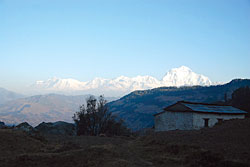|
|
| ON TOP OF THE WORLD: Nangi\'s school, amidst the spectacular backdrop of Dhaulagiri, uses wireless technology to conquer distance and connect itself with the global village. Magsaysay winner Mahabir Pun (below, left) at an outdoor meeting of his school. |
Many others who have won major international awards rest on their laurels, bask in celebrityhood, or go into early retirement. Not Mahabir Pun.
After he won the Magsaysay Award for his pioneering work to bridge the digital divide in Nepal's remote mountains last year, Pun has thrown himself with renewed vigour to enlarge the scope and spread of his effort to raise the livelihood of his native region.
"We have been trying to scale up income-generation," says the soft-spoken 53-year-old, "we want to expand IT services so it helps agriculture, education, health and tourism in even more remote villages."
Pun's village of Nangi is located on a forested mountainside at 2,250m and requires a seven-hour vertical climb on foot from Beni. A computer engineer in the United States, he did something unusual for a Nepali: he came back to Nepal after graduation. And even more unusual, he returned to his home village. ('Web pioneer', #360) Pun set up the Nepal Wireless Networking Project in Nangi in 1997, where there was no electricity, no telephone lines, no roads, no health posts and few schools. Pun believed that by leapfrogging technology with computers, solar power and wireless connectivity, he could help lift his village out of poverty.
It worked. The literacy rate shot up as children used computers and the internet to broaden their horizons. The health post used telemedicine to treat patients. Families in the surrounding villages who have relatives working abroad used email and chat, saving money on international phone calls.
Now managed by Nangi's Himanchal Higher Secondary School, the venture pulled Nangi out of its seclusion. Nangi's network is connected to Pokhara through a line-of-sight microwave antenna fixed on an oak tree four hours up the mountain. Pun is now working on wireless telephony, e-libraries and online markets to help connect even more remote villages and help people find jobs.
|
|
Healthcare services, eco-farming and small handicraft industries have all started to contribute to income generation. All are collaborative ventures involving the whole community.
The Nangi Clinic and Women's Centre now has three rooms for patients and a dental treatment area. "The government doesn't have a health clinic here, so we decided to start one ourselves," says nurse Lila Pun. The clinic receives online medical advice from doctors at Om Hospital in Pokhara.
The villagers have also started to harvest local medicinal herbs. Caretaker Moti Purja looks after 21,000 seedlings of medicinal herbs in greenhouses and fruits on steep terraces. The 70-year-old ex-British Army officer is also busy with an organic farm that raises fish, ducks, chicken and rabbits.
All this is expected to tap into the resurgent tourism industry. With new highways being built, trekkers will be venturing out to more remote parts of the district and Nangi wants to promote itself as an eco-friendly destination close to the trekking hub of Ghorepani.
Nangi and the neighbouring village of Paudwar are working together to promote tourism online. Camping grounds are being built and new trails cleared.
Pun is a modest man, but he has ambitious long-term goals. One of them is to set up a university here by 2015. "The activities we're engaged in now will help create jobs and raise income, but at the end of the day, it is education that will help sustain it," he told Nepali Times.
At a school board meeting last month, the village committee was busy planning scholarships for students and brainstorming on how to fundraise for the university.
Adds Pun: "We want to encourage local talent to explore sustainable eco-programs, creative people who can think out of the box."
www.nepalwireless.net/ index.php




